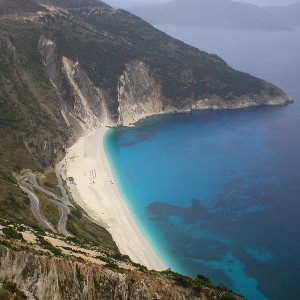
As the gravel road, barely wide enough for one car, curves around the blind corners, the on-coming car leaves millimeters for error. You close your eyes and wish that it weren’t only the corners that were blind. Seconds pass and a lifetime later you open your eyes again and breathe in a second life.
As the corners caress the mountains for the final time, your heart stops. Your little white Suzuki Jimmy like a dove against the picturesque green backdrop glides over the hills, up and down the endless green, over-looking the crystal waters below, reflecting the clear blue skies above.
You’ve read about places like this in fairytales, but never knew they existed.
You reach your summer place of solace for the next few days, unpack and take a short stroll down to the town, passing century old doors and stone houses on your way. The restaurants over look out onto the water, the people are plentiful and always smiling. You wonder how you are going to overcome the language barrier, but before you can say a word, the Greek waiter addresses you in a thick South African accent, in perfect English.
The food is made in the kitchen metres away, the homely smells linger on your nostrils as you immerse yourself in the tranquillity of the ocean in front of you and joyous banter around you.
The food arrives and the first taste melts in your mouth; you’ve been to good Greek restaurants at home, but this is something that makes every single taste bud tingle. You take a moment to rest after the meal, undo the top button on your pants and slip away into a dream state.
A little while later, you drive up to the town of Exoghi. You follow the windy roads and take pictures of the goats standing aimlessly off to the side. You park the car like a local, wherever, and make your way up to the lookout.
The walk is long and the path unsteady, but you take no notice. At the top of the mountain you look out onto the world below you. Far below, Northern Ithaca, Afales and Lefkada are illuminated by the brilliant sun. Beauty beyond words. As you trek back down, you notice the bent road signs, the unpaved footpaths, and you wonder why no one has fixed them. Then you realise, no one can afford to.
It’s hard to believe that a place like this, where everyone seems so happy and carefree, where the land is full of life and the culture of the townspeople so rich with life, is in dire financial debt. For Greece, bankruptcy is a reality.
Twenty-something year-olds are leaving their families and coming to the land of opportunities, Australia. Parents are crying, not because of sadness, but because they are so happy that their children can go to a place where they can find work and hope for the future.
The poor financial status of Greece goes back a very long way. Dionysius the Elder, ruled the Greek city state of Syracuse from 407 BC until his death in 367 BC. After careless spending on military and his lavish lifestyle, he found himself short of cash.
To overcome the problem, he forced all the citizens to hand him their money and changed the notes from one drachma to two. In recent times, Greece’s money problems have not changed.
For the better part of a decade, Greece has been on a debt binge, debts are 150% of the countries income. Basically, Greece has borrowed a lot more money over the years than it could afford to pay back. Greece was rescued by its euro-zone neighbours in 2010 with a bailout but at an enormous cost, plunging the country into a recession.
The problem with a whole country being debt is that all those who have extended loans are also effected, in this case French pension funds and the German banks, which is feared will bring the fate of the euro into question.
To save Greece, a second multi-billion dollar bailout package was released in early March. The $170 billion dollar aid bailout hopes to reduce the estimated size of Greece’s 2020 debt. However, the care-free attitude of the Greeks, while stagnated a little, still remains and hope for the future is clear.
While the financial status of Greece is pending and the country is poor economically, the beauty of the land will remain rich forever.
All around the country, citizens remain positive; the islands of Mykonos and Ios are still among the top tourist destinations visited each year and the locals in Kefalonia go about their daily routines with a smile on their face.
Let’s hope the new bailout packages can restore Greece to its previous prosperous state.
Christina Lovrecz is a Graduate Diploma in Journalism student at La Trobe University and is one of upstart’s staff writers. You can follow her on Twitter: @clovrecz






